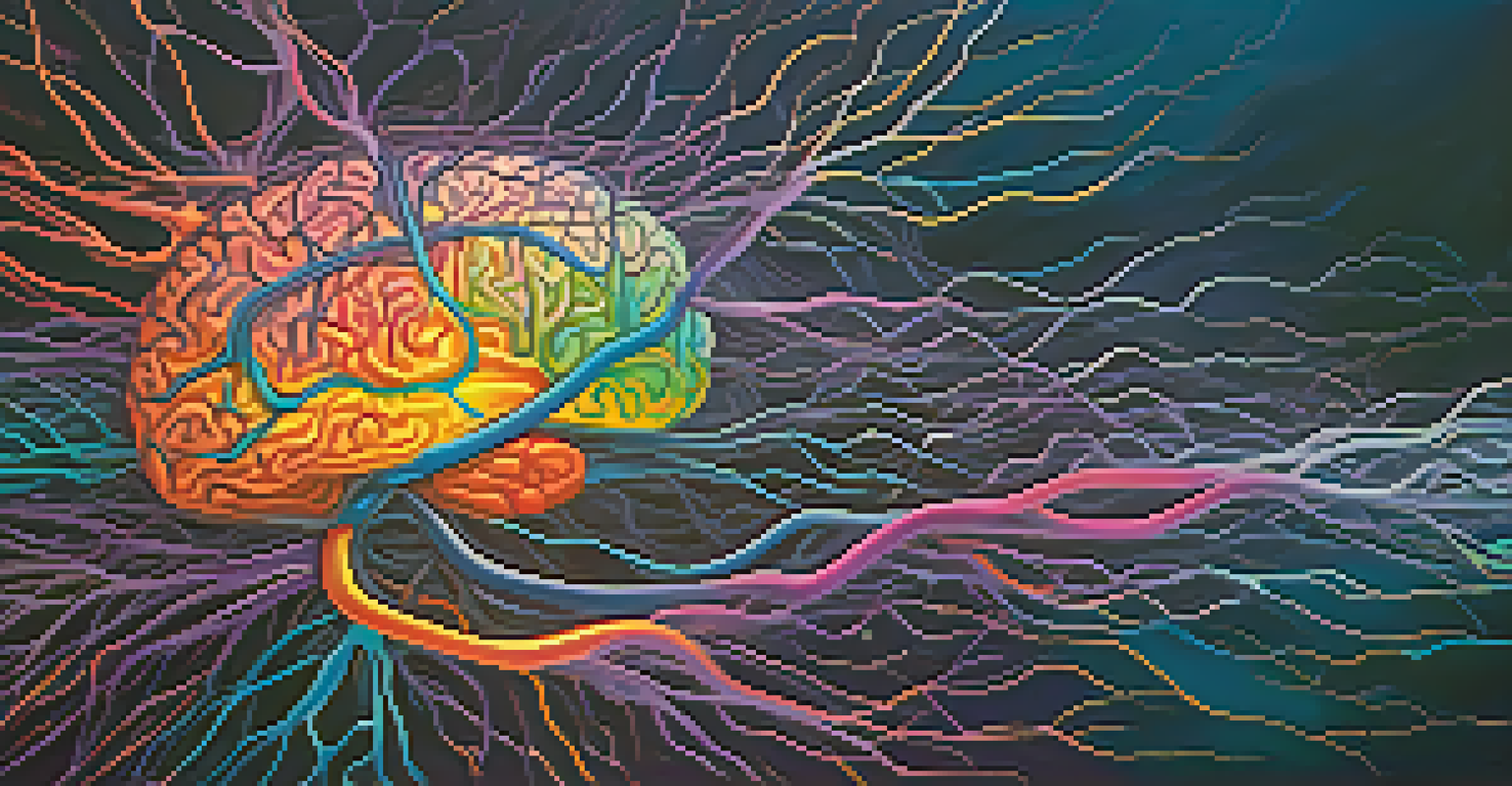Mystical Experiences Induced by Entheogens: A Psychological View

Understanding Entheogens and Their Role in Mystical Experiences
Entheogens are substances, often derived from plants, that are used to induce altered states of consciousness. These experiences can range from profound spiritual insights to deep emotional connections with the universe. The term 'entheogen' comes from Greek roots meaning 'generating the divine within.' This highlights the spiritual aspect many users report during their experiences.
Psychedelics can help you to see your life from a different perspective, opening up new pathways for understanding and healing.
Historically, cultures around the world have employed entheogens in religious and healing practices. For instance, indigenous tribes in the Amazon have utilized ayahuasca for centuries as a means of spiritual growth and community bonding. As modern society grapples with mental health issues, there’s a renewed interest in these substances, particularly in therapeutic settings.
Understanding the psychological impact of entheogens involves exploring how they affect our perception and consciousness. Users often describe experiences filled with vivid imagery, emotions, and sensations that can lead to insights about their lives or the nature of existence. This intersection of psychology and spirituality opens up fascinating discussions about the human mind.
The Psychological Mechanisms Behind Mystical Experiences
When we delve into the psychological mechanisms at play during entheogen use, we find that these substances can alter brain activity significantly. Research indicates that compounds like psilocybin and LSD can enhance connectivity between different regions of the brain. This increased communication can lead to a feeling of oneness and interconnectedness, often described in mystical experiences.

Moreover, the default mode network (DMN), which is associated with self-referential thoughts and ego, shows decreased activity when under the influence of entheogens. This can lead to a temporary dissolution of the ego, allowing individuals to feel a sense of unity with the universe or a higher power. Such experiences can be transformative, providing insights that might be difficult to access in a normal state of mind.
Entheogens Induce Mystical Insights
Entheogens can lead to profound spiritual and emotional experiences that enhance personal understanding and connection with the universe.
These psychological shifts can also invoke powerful emotional responses, which may contribute to the lasting effects of these experiences. Many individuals report changes in their worldview, improved emotional well-being, and a greater sense of purpose following their experiences with entheogens. This transformation underscores the potential therapeutic benefits of such substances.
Mystical Experiences: A Personal Journey Through Entheogens
For many, the journey with entheogens is deeply personal and often life-changing. Take, for instance, someone who has struggled with depression for years. After a guided session with psilocybin, they might find themselves experiencing a profound sense of joy and clarity, reconnecting with feelings long buried. Such narratives highlight the transformative power these substances can hold.
The experience of unity and interconnectedness can lead to profound insights and a reevaluation of one's life and purpose.
Individuals often describe their mystical experiences as feeling 'larger than life' or 'beyond words.' This ineffability is a hallmark of such experiences, often making it challenging to convey the depth of their insights to others. However, the essence of these moments can lead to new perspectives on relationships, purpose, and the self.
The personal nature of these experiences also highlights the importance of set and setting—an important concept in psychedelic therapy. The mindset of the individual and the environment in which the experience takes place can significantly influence the outcome. This underscores the necessity for respectful and informed use of entheogens.
The Role of Set and Setting in Entheogenic Experiences
Set and setting are crucial elements in influencing the outcomes of entheogenic experiences. 'Set' refers to the individual's mindset, including their expectations, mood, and mental health status, while 'setting' encompasses the physical and social environment in which the experience occurs. Both factors can significantly shape the nature of the experience, leading to either positive or negative outcomes.
Creating a safe, supportive environment can enhance the likelihood of a positive mystical experience. For instance, many therapeutic sessions involve trained guides who help individuals navigate their experiences, providing reassurance and context. This supportive framework can lead to deeper insights and emotional healing, allowing individuals to explore their inner worlds safely.
Set and Setting Shape Experiences
The mindset and environment in which entheogens are used significantly influence the nature and outcome of the mystical experiences.
Conversely, an unstable or threatening environment can lead to challenging experiences, often referred to as 'bad trips.' These can provoke anxiety and discomfort, detracting from the potential benefits of the entheogen. Therefore, understanding and optimizing set and setting is essential for maximizing the positive impact of these powerful substances.
The Neuroscience of Mystical Experiences Induced by Entheogens
The burgeoning field of neuroscience has begun to unravel the complexities of how entheogens induce mystical experiences. Using neuroimaging techniques, researchers have been able to observe changes in brain activity during these experiences. For example, studies show increased blood flow to areas associated with emotional processing and sensory perception, which can lead to heightened awareness and mystical feelings.
One fascinating finding is the role of serotonin receptors, particularly the 5-HT2A receptor, which is activated by many classic psychedelics. This activation appears to play a crucial role in the subjective experience of connectedness and transcendence often reported by users. Understanding these biological pathways provides valuable insight into the mechanisms behind these profound experiences.
Furthermore, the implications of this research extend beyond mere curiosity; they offer potential therapeutic avenues for treating mental health conditions. By understanding how entheogens affect brain function and emotional processing, researchers may develop new treatment protocols for conditions like PTSD, depression, and anxiety, using mystical experiences as a catalyst for healing.
Potential Therapeutic Benefits of Mystical Experiences
The therapeutic potential of mystical experiences induced by entheogens is gaining traction in both scientific and clinical communities. Many studies suggest that these experiences can lead to significant improvements in mental health, particularly for those grappling with depression, anxiety, and PTSD. The profound insights gained during these experiences can often help individuals reframe their trauma and emotional struggles.
For example, clinical trials have demonstrated that patients undergoing psilocybin therapy report decreased symptoms of depression and anxiety following their mystical experiences. This suggests that the insights and emotional breakthroughs achieved during these experiences may empower individuals to confront and process their challenges more effectively.
Therapeutic Potential of Entheogens
Research suggests that mystical experiences from entheogens can offer substantial mental health benefits, particularly for conditions like depression and PTSD.
Moreover, the communal aspect of guided sessions can foster a sense of connection and support among participants, further enhancing the therapeutic effects. As more research emerges, the potential for integrating entheogenic experiences into mental health treatment models becomes increasingly clear, highlighting a promising frontier in mental health care.
The Future of Entheogens in Psychological Research and Therapy
The future of entheogens in psychological research and therapy looks promising, as attitudes toward these substances continue to evolve. Increasingly, researchers are advocating for a more nuanced understanding of entheogens and their potential benefits. As stigma fades, more studies are being conducted to explore the therapeutic possibilities these substances offer.
The ongoing research not only helps to demystify the effects of entheogens but also informs best practices for their use in therapeutic settings. As clinicians become more knowledgeable about the psychological implications of these experiences, they can provide better support for individuals exploring entheogens for healing and personal growth.

Ultimately, the future holds the potential for integrating entheogens into mainstream psychological practice. With careful research and ethical consideration, these substances may play a pivotal role in reshaping our understanding of mental health and the human experience, opening doors to new possibilities for healing and self-discovery.